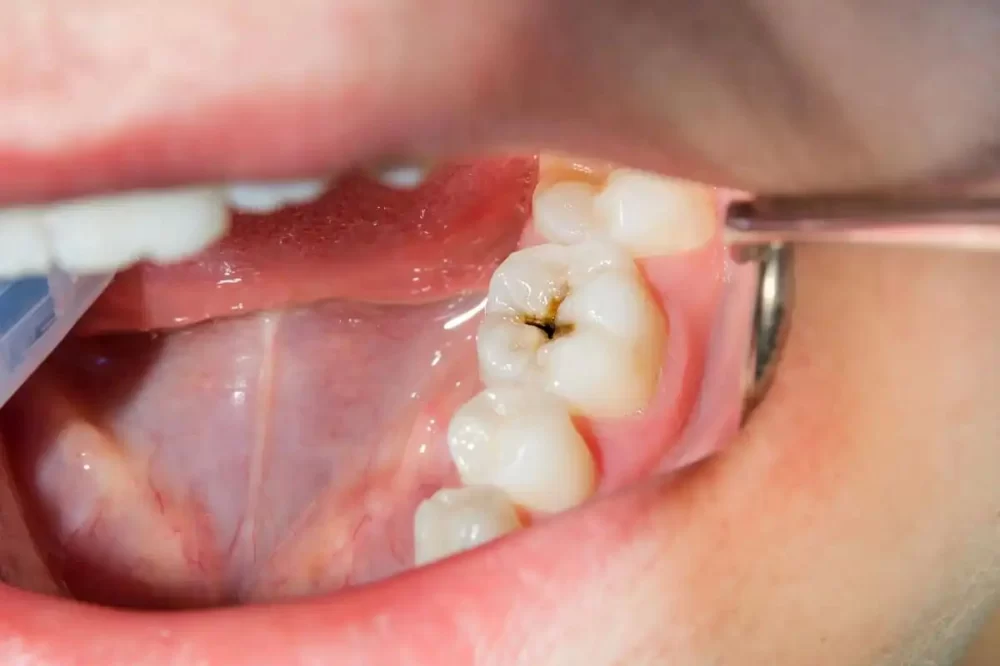
Treating a Cavity Naturally: Effective Methods for Tooth Health
As someone who’s always been cautious about my health, I remember the first time I noticed a small dark spot on one of my teeth. I wasn’t sure whether it was a cavity, but the discomfort made me realize that I needed to do something about it before it got worse. Of course, I scheduled a dentist appointment, but I was also curious if there were any natural ways to treat a cavity. Over the years, I’ve come across a variety of natural remedies that can help with tooth decay and even prevent further damage. In this article, I’ll share some of the methods that I’ve used and explored to treat cavities naturally, as well as some preventative tips that have worked for me.
1. Understanding Cavities: The Importance of Early Action
Before diving into natural treatments, it’s essential to understand what a cavity is and how it forms. A cavity, also known as tooth decay or dental caries, occurs when harmful bacteria in the mouth produce acids that erode tooth enamel. This process begins slowly, often without noticeable pain, but over time it can result in a small hole or soft spot in the tooth. I had no idea how quickly a small cavity could worsen until I learned more about the stages of tooth decay.
The key to preventing further damage is early detection and intervention. If left untreated, a cavity can grow, leading to more severe tooth damage and even infections. While professional dental care is often necessary for advanced cavities, there are several natural remedies that can be used to address early-stage cavities and slow down the progression of tooth decay. I found that these methods work best in conjunction with regular dental checkups and proper oral hygiene.
2. Oil Pulling: A Time-Tested Remedy for Oral Health
One of the first natural treatments I came across was oil pulling, an ancient practice that involves swishing oil in your mouth to remove bacteria and promote oral health. Initially, I was skeptical about whether something as simple as swishing oil could help with a cavity, but after trying it for a few weeks, I noticed an improvement in the overall health of my gums and teeth.
The most common oils used for oil pulling are coconut oil, sesame oil, and sunflower oil. I chose coconut oil because it contains lauric acid, which has antimicrobial properties that help fight the bacteria responsible for tooth decay. Every morning, I would take about one tablespoon of coconut oil and swish it around in my mouth for 10-15 minutes. Although it was a little time-consuming at first, I quickly got used to it and began to notice that my teeth felt cleaner and less sensitive. Some studies even suggest that oil pulling can help reduce plaque buildup and prevent cavities from worsening, making it a helpful addition to my oral care routine.
3. Using Remineralizing Toothpaste and Natural Ingredients
While I’ve always been diligent about brushing my teeth, I soon realized that not all toothpaste is created equal when it comes to cavity prevention. After learning about the power of remineralization, I switched to a remineralizing toothpaste that contains fluoride-free ingredients such as hydroxyapatite, calcium phosphate, or xylitol. These ingredients can help rebuild weakened enamel and remineralize areas affected by early-stage cavities.
In addition to using remineralizing toothpaste, I also started incorporating other natural ingredients into my oral care routine. For example, I’ve used baking soda as a gentle abrasive to remove surface stains and plaque buildup. I mix a small amount of baking soda with water to create a paste and use it to brush my teeth a few times a week. Baking soda helps neutralize acids in the mouth, which can prevent further enamel erosion. However, I was careful not to use it too often, as its abrasive nature could potentially wear down enamel if used excessively.
1. Xylitol: A Sweet Solution for Tooth Health
Xylitol is a natural sugar alcohol that has been shown to help prevent cavities. When I first learned about xylitol, I was amazed to discover that it can actually inhibit the growth of the bacteria responsible for causing tooth decay. I started incorporating xylitol into my daily routine by using xylitol-based toothpaste and chewing sugar-free gum sweetened with xylitol. It was a sweet alternative to sugar that not only satisfied my cravings but also supported my dental health.
4. Diet and Nutrition: The Foundation of Healthy Teeth
Diet plays a crucial role in maintaining healthy teeth and preventing cavities. When I first began researching natural cavity treatments, I realized that the foods I was eating could either support or harm my dental health. By making a few dietary changes, I found that I could significantly reduce my risk of developing cavities.
1. Increase Calcium and Vitamin D Intake
Calcium is essential for maintaining strong teeth and bones, while vitamin D helps the body absorb calcium more effectively. I made it a point to include more calcium-rich foods, such as dairy products, leafy greens, and fortified plant-based milks, into my diet. I also started taking a vitamin D supplement, especially during the winter months when sunlight exposure is limited. These small adjustments helped strengthen my teeth and reduced my vulnerability to cavities.
2. Avoid Sugar and Acidic Foods
Sugar is a major contributor to tooth decay, and I knew that if I wanted to prevent cavities, I needed to limit my sugar intake. I started avoiding sugary snacks, drinks, and processed foods that could promote bacterial growth and enamel erosion. In addition, acidic foods like citrus fruits and soda can weaken tooth enamel, so I made sure to consume them in moderation and rinse my mouth with water afterward to neutralize the acids.
5. Herbal Remedies for Cavities
In addition to the methods I’ve already mentioned, I also explored several herbal remedies that are believed to help with tooth decay. While these remedies may not be as effective as professional dental treatment for advanced cavities, they can help support overall oral health and prevent further decay.
1. Neem: The Natural Antibacterial
Neem is an herb commonly used in traditional medicine for its antibacterial properties. I started using neem oil as a mouthwash and also applied neem powder to my teeth as a natural toothpaste. Neem helps fight the bacteria that cause cavities and gum disease, making it a great natural option for maintaining oral hygiene.
2. Clove Oil: Pain Relief and Bacterial Protection
Clove oil has long been used for dental care due to its pain-relieving and antibacterial properties. When I experienced discomfort from my cavity, I applied diluted clove oil directly to the affected area. Not only did it numb the pain, but it also helped reduce the bacterial activity in my mouth, supporting the healing process. Clove oil can be a great natural remedy for soothing tooth pain while also protecting against further decay.
6. When to Seek Professional Dental Care
While these natural remedies have helped me manage minor cavities and maintain oral health, it’s important to remember that they are not a substitute for professional dental care. If you notice significant pain, swelling, or if your cavity worsens despite your efforts, it’s time to visit a dentist. Professional dental care is essential for repairing advanced cavities and preventing further complications, such as infections or abscesses.
Natural treatments can certainly help with early-stage cavities and promote overall oral health, but they are best used as part of a holistic approach that includes regular dental check-ups. I’ve found that by combining natural remedies with professional dental care, I’ve been able to maintain strong, healthy teeth while minimizing the risk of cavities and other dental issues.







 Capital City Pediatric Dentistry3.0 (41 review)
Capital City Pediatric Dentistry3.0 (41 review) Jennifer Chiang, DDS5.0 (221 review)
Jennifer Chiang, DDS5.0 (221 review) RiverRock Dental4.0 (157 review)
RiverRock Dental4.0 (157 review) Monarch Dental & Orthodontics4.0 (593 review)
Monarch Dental & Orthodontics4.0 (593 review) Dr. Majd Babik, DDS4.0 (43 review)
Dr. Majd Babik, DDS4.0 (43 review) Advanced Dental Techniques5.0 (325 review)
Advanced Dental Techniques5.0 (325 review) The Importance of Oral Health Education During Pregnancy for a Healthy Pregnancy
The Importance of Oral Health Education During Pregnancy for a Healthy Pregnancy Best Tips for Brushing Your Teeth Properly for Healthy Gums: Essential Techniques for Oral Health
Best Tips for Brushing Your Teeth Properly for Healthy Gums: Essential Techniques for Oral Health Why Skipping Dental Checkups Can Lead to Bigger Oral Health Problems
Why Skipping Dental Checkups Can Lead to Bigger Oral Health Problems Advantages of Porcelain Dental Restorations
Advantages of Porcelain Dental Restorations How Can Diabetes Cause Tooth and Gum Problems? Preventing and Managing Oral Health Issues
How Can Diabetes Cause Tooth and Gum Problems? Preventing and Managing Oral Health Issues Healthy Habits for Promoting Good Oral Health and Hygiene: Tips for a Healthy Smile
Healthy Habits for Promoting Good Oral Health and Hygiene: Tips for a Healthy Smile